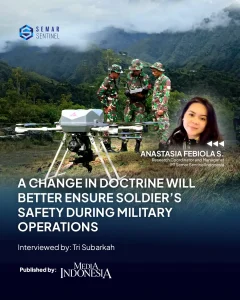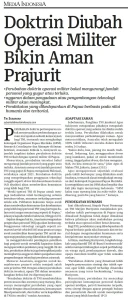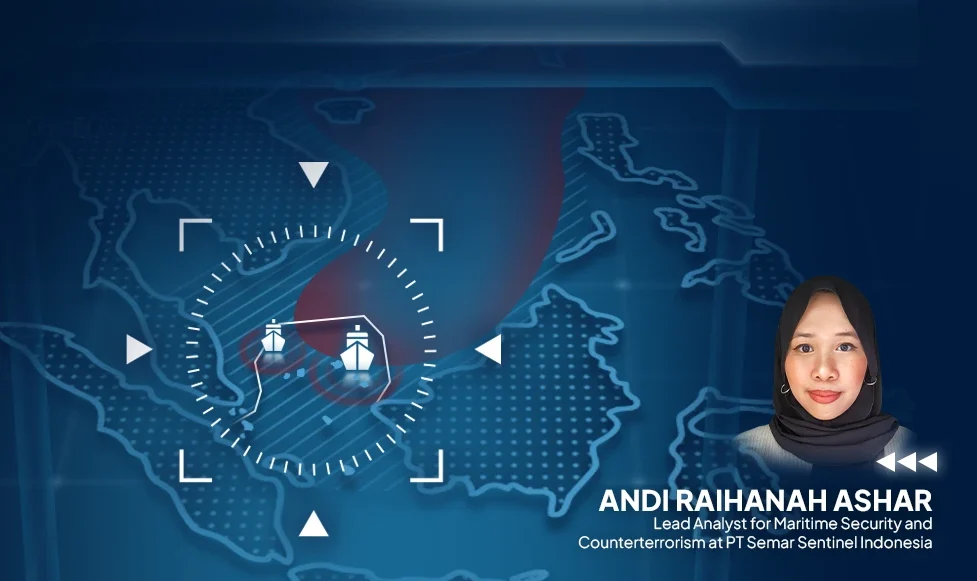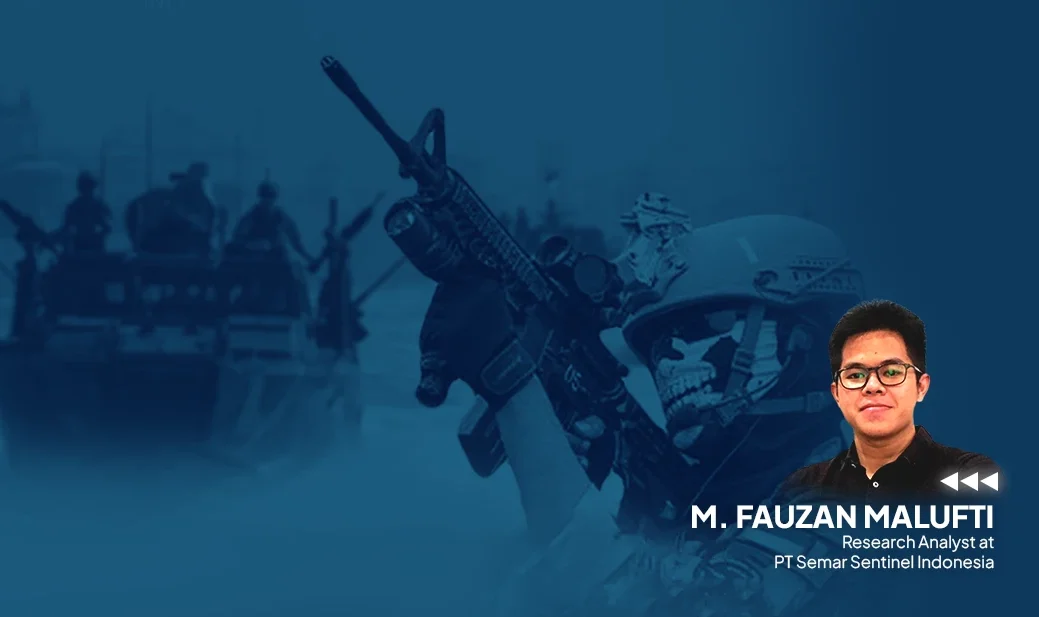Back To List
February 4, 2025
A Change in Doctrine Will Better Ensure Soldier’s Safety During Military Operations
Categories :
Defence Doctrine- A change in military operations doctrine will decrease personnel fatalities and wounds
- The budget for military technology procurement and development will increase
- The approach in Papua will emphasise humanistic and territorial (sic) values
Adapting military doctrine to evolving strategic conditions is essential for the Indonesian National Armed Forces (TNI), including in facing [challenges posed by] the Free Papua Movement (OPM). The Research Coordinator and Manager at PT Semar Sentinel Indonesia, Anastasia Febiola S., highlighted the implications of doctrinal shifts on TNI’s operations in Papua.
Ms. Febiola argued that such changes will reduce casualties and injuries among TNI personnel. She highlighted the number of TNI personnel fatalities in Papua has fluctuated since at least 2021. Changes in doctrine, which prioritise the use of advanced technologies such as drones and artificial intelligence (AI), are expected to improve security for the TNI.
“TNI operations in Papua to uphold [Indonesia’s] sovereignty have been going on for years, yet risks to [its] personnel remains a challenge. Involving unmanned systems will provide greater security and safety for TNI personnel, particularly in high-risk missions such as those in Papua”, she explained to Media Indonesia, on Sunday (2/2).
Similarly, Ms. Febiola noted that the deployment of TNI personnel will also decrease. The use of advanced technologies, such as unmanned aerial vehicles (UAVs), enables the TNI to minimise the need for extensive troop deployments in the field.
She highlighted the importance of personnel training in order to enhance the TNI’s capacity to operate advanced equipment. On the other hand, doctrine changes will lead to a budget increase for unmanned systems procurement or development.
According to Ms. Febiola, the budget allocation for soldiers’ welfare will always be one of TNI’s priorities. However, with the shift in doctrine, the TNI’s efforts to balance between both priorities will be put into question.
“Doctrine changes within the TNI require meticulous planning and evaluation, particularly in response to evolving security situations, government fiscal capacity, as well as the TNI’s culture and capabilities”, said Ms. Febiola.
ADAPTATION WITH CHANGING TIMES
Previously, the TNI Commander, Gen. Agus Subiyanto, stated that the military would replace its operational doctrine, which was considered outdated. These changes were made to adapt with the evolving strategic landscape. M. Subiyanto highlighted Australia as an example, noting that the country has changed its infantry tactics within a span of 3-5 years.
“In the past, warfare was largely traditional. Today, [war] features kamikaze drones and AI [targeted operations], [you] just need to use a drone to chase [and eliminate the threat]. This is what we are heading for”, said M. Subiyanto at the TNI Headquarters, Jakarta, Friday (31/1).
Subiyanto expressed his appreciation of the TNI personnel’s combat tactics evaluation, including strategies to counter attacks by OPM. He claimed that OPM will now have to think twice before attacking Indonesia. “If OPM considers attacking us, they will think twice. Any attack against us will be met with decisive force,” he said.
HUMANISTIC APPROACH
When asked for clarification, the Head of TNI Information Centre (Kapuspen), MG Hariyanto, explained that the changes in military tactics in Papua that the TNI Commander should not be interpreted as a shift toward open warfare or large-scale military operations.
The TNI’s approach in Papua is grounded in humanist and territorial principles, with a strong focus on ensuring the security and well-being of the local community.
As M. Hariyanto further explained, this approach ensures that the TNI’s actions in the “Land of Cenderawasih” consistently prioritise civilian protection, regional development, and efforts to mitigate conflict, preventing its escalation.
“The doctrine changes in question focus on adapting operational strategies and tactics to better align with the evolving dynamics of emerging threat”, explained M. Hariyanto.
He stated that the changes encompass enhancing personnel capabilities in intelligence operations, implementing integrated security patrols, and fostering greater cooperation with law enforcement institutions and regional governments to create a more secure environment.




